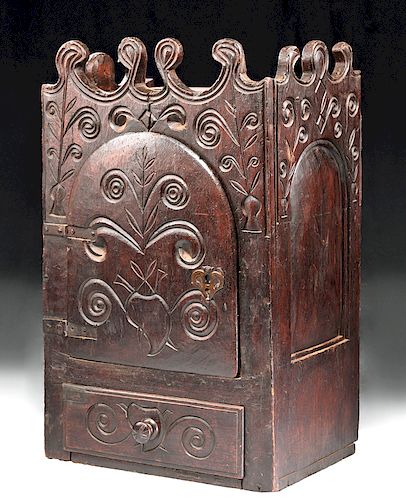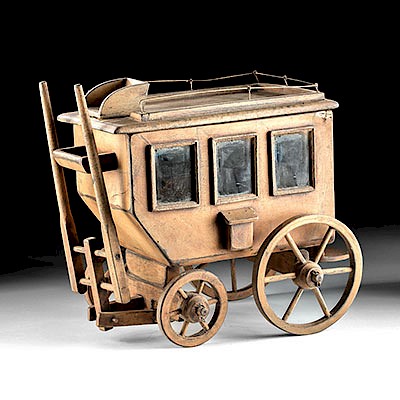17th C. Spanish Colonial Walnut Altar Tabernacle
Lot 161
About Seller
Artemis Fine Arts
686 S Taylor Ave, Ste 106
Louisville, CO 80027
United States
Selling antiquities, ancient and ethnographic art online since 1993, Artemis Gallery specializes in Classical Antiquities (Egyptian, Greek, Roman, Near Eastern), Asian, Pre-Columbian, African / Tribal / Oceanographic art. Our extensive inventory includes pottery, stone, metal, wood, glass and textil...Read more
Estimate:
$7,000 - $10,000
Absentee vs Live bid
Two ways to bid:
- Leave a max absentee bid and the platform will bid on your behalf up to your maximum bid during the live auction.
- Bid live during the auction and your bids will be submitted real-time to the auctioneer.
Bid Increments
| Price | Bid Increment |
|---|---|
| $0 | $25 |
| $300 | $50 |
| $1,000 | $100 |
| $2,000 | $250 |
| $5,000 | $500 |
| $10,000 | $1,000 |
| $20,000 | $2,500 |
| $50,000 | $5,000 |
| $100,000 | $10,000 |
| $200,000 | $20,000 |
About Auction
By Artemis Fine Arts
Nov 14, 2019
Set Reminder
2019-11-14 10:00:00
2019-11-14 10:00:00
America/New_York
Bidsquare
Bidsquare : Ethnographic | Tribal | American Frontier
https://www.bidsquare.com/auctions/artemis-gallery/ethnographic-tribal-american-frontier-4634
Featuring Pre-Columbian, Tribal / Oceanic, Spanish Colonial, historical examples from the Spanish, Mexican, and American frontiers, fossils, and more. All items offered for sale have been legally acquired, are legal to sell and are guaranteed to be as described or your money back. Artemis Fine Arts info@artemisgallery.com
Featuring Pre-Columbian, Tribal / Oceanic, Spanish Colonial, historical examples from the Spanish, Mexican, and American frontiers, fossils, and more. All items offered for sale have been legally acquired, are legal to sell and are guaranteed to be as described or your money back. Artemis Fine Arts info@artemisgallery.com
- Lot Description
North America, Spanish Colonial period, Mexico City, ca. 17th century CE. Wow! An incredibly preserved, handsome, dark walnut altar tabernacle. It features a hinged, arched doorway that swings open to reveal a wooden shelf. This door is equipped with an iron lock, although the key is no longer present. The upper part of the cabinet features crenellations, giving it an ornate appearance befitting its use, while deeply incised floral and vine motifs decorate its front face and sides. The handmade nature of the piece is beautifully evident when examining the details of the carving, with the marks on the wood - especially around the crenellations and arches on the sides - bearing the hallmarks of antique wood working tools. This would have graced a local church rather than a massive cathedral, its face beloved by the community of worshippers who met there. Size: 14.4" L x 20.25" W x 31" H (36.6 cm x 51.4 cm x 78.7 cm)
The tabernacle, the "dwelling place", houses the Eucharist outside of the Catholic Mass, providing a location where it can be protected and adored. A tabernacle like this one would have been central to the church in which it was housed, serving as a fixed point for prayer and worship. Indeed, in many of the Spanish mission churches from Peru to California, people still meet to observe the rise of the winter solstice, which can throw light directly onto the altar tabernacle. Recent scholarship suggests that many Spanish missions churches had these items placed in such a way as to catch the light on that day, symbolically linking the Catholic faith with that of sun worship to inspire indigenous people to truly convert.
Provenance: private Glorieta, New Mexico, USA collection
All items legal to buy/sell under U.S. Statute covering cultural patrimony Code 2600, CHAPTER 14, and are guaranteed to be as described or your money back.
A Certificate of Authenticity will accompany all winning bids.
We ship worldwide and handle all shipping in-house for your convenience.
#149499The interior shelf is a recent addition and the top of the tabernacle has also been repaired/restored. Wear on surface commensurate with age, including some scratches, chips, and nicks. Weathering has resulted in some stable cracks to the surface, notably on the front where there is some separation, and the back is lost. The shelf on the interior moves freely. The piece is overall in very nice condition with a rich patina. Key is not present.Condition
- Shipping Info
-
All shipping is handled in-house for your convenience. Your invoice from Artemis Gallery will include shipping calculation instructions. If in doubt, please inquire BEFORE bidding for estimated shipping costs for individual items.
-
- Buyer's Premium



 EUR
EUR CAD
CAD AUD
AUD GBP
GBP MXN
MXN HKD
HKD CNY
CNY MYR
MYR SEK
SEK SGD
SGD CHF
CHF THB
THB














